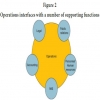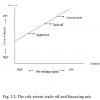Operations Management - Introduction to Operations Management
Introduction to Operations Management
Posted On :
Operations Management is a field of management science that deals with the design and management of products, processes, services and supply chains.
Introduction
to Operations Management
Operations Management is a field of management science that deals with the design and management of products, processes, services and supply chains. It deals with acquisition, development, and utilization of various resources that any firms need to deliver the goods and services to their clients want.
The subject coverage in Operations Management ranges from strategic to tactical and to operational levels. For example, it deals with strategic issues such as determining the location for a manufacturing company, type of manufacturing process and size for the factory, expansion strategy for plant location, other manufacturing locations, deciding the structure of service or telecommunications networks, and designing technology supply chains etc.
Also, various tactical issues like, plant layout and structure, project management methods, and equipment selection and replacement, the application of Operations Management is evident. Operational issues include production scheduling and control, inventory management, quality control and inspection, traffic and materials handling, and equipment maintenance policies.
Production and Operations Management (“POM”) is about the transformation of production and operational inputs into “outputs” that, when distributed, meet the needs of customers. The process is often referred to as the “Conversion Process”.
There are several different methods of handling the conversion or production process - Job, Batch, Flow and Group. POM incorporates many tasks that are interdependent, but which can be grouped under five main headings, which is briefly discussed in the following pages.
Marketers in any business concerns about selling products that meet customer needs and wants. In fulfilling this objective, the role of Production and Operations play a major role; it has to ensure that the business actually makes the required products in accordance with the expectations of market and consumers and translated as a plan. The role of PRODUCT in POM therefore concerns areas such as:
1. Performance
2. Aesthetics
3. Quality
4. Reliability
5. Quantity
6. Production costs
7. Delivery dates
To make the needed product, the ‘PLANT’ of some kind is needed for any business house. This will comprise the bulk of the fixed assets and many short term assets, set of creditors, who supply the requirement materials and many others to the business. In determining which PLANT to use, management must consider areas such as
1. Future demand (volume, timing)
2. Design and layout of factory, equipment, offices
3. Productivity and reliability of equipment
4. Need for (and costs of) maintenance
5. Health and safety (particularly the operation of equipment)
6. Environmental issues (e.g. creation of waste products)
There are many different ways of producing a product. Management must choose the best process, or series of processes. They will consider
1. Available capacity
2. Available skills
3. Type of production
4. Layout of plant and equipment
5. Safety
6. Production costs
7. Maintenance requirements
In the production management terminology, Programme concerns the dates and times of the products that are to be produced and supplied to customers. The decisions made about programme will be influenced by factors such as
1. Purchasing patterns (e.g. lead time)
2. Cash flow
3. Need for / availability of storage
4. Transportation
Production depends on PEOPLE, whose skills, experience and motivation vary. Key people-related decisions will consider the following areas
1. Wages and salaries
2. Safety and training
3. Work conditions
4. Leadership and motivation
5. Unionisation
6. Communication
Operations Management is a field of management science that deals with the design and management of products, processes, services and supply chains. It deals with acquisition, development, and utilization of various resources that any firms need to deliver the goods and services to their clients want.
The subject coverage in Operations Management ranges from strategic to tactical and to operational levels. For example, it deals with strategic issues such as determining the location for a manufacturing company, type of manufacturing process and size for the factory, expansion strategy for plant location, other manufacturing locations, deciding the structure of service or telecommunications networks, and designing technology supply chains etc.
Also, various tactical issues like, plant layout and structure, project management methods, and equipment selection and replacement, the application of Operations Management is evident. Operational issues include production scheduling and control, inventory management, quality control and inspection, traffic and materials handling, and equipment maintenance policies.
Production and Operations Management (“POM”) is about the transformation of production and operational inputs into “outputs” that, when distributed, meet the needs of customers. The process is often referred to as the “Conversion Process”.
There are several different methods of handling the conversion or production process - Job, Batch, Flow and Group. POM incorporates many tasks that are interdependent, but which can be grouped under five main headings, which is briefly discussed in the following pages.
Product
Marketers in any business concerns about selling products that meet customer needs and wants. In fulfilling this objective, the role of Production and Operations play a major role; it has to ensure that the business actually makes the required products in accordance with the expectations of market and consumers and translated as a plan. The role of PRODUCT in POM therefore concerns areas such as:
1. Performance
2. Aesthetics
3. Quality
4. Reliability
5. Quantity
6. Production costs
7. Delivery dates
Plant
To make the needed product, the ‘PLANT’ of some kind is needed for any business house. This will comprise the bulk of the fixed assets and many short term assets, set of creditors, who supply the requirement materials and many others to the business. In determining which PLANT to use, management must consider areas such as
1. Future demand (volume, timing)
2. Design and layout of factory, equipment, offices
3. Productivity and reliability of equipment
4. Need for (and costs of) maintenance
5. Health and safety (particularly the operation of equipment)
6. Environmental issues (e.g. creation of waste products)
Processes
There are many different ways of producing a product. Management must choose the best process, or series of processes. They will consider
1. Available capacity
2. Available skills
3. Type of production
4. Layout of plant and equipment
5. Safety
6. Production costs
7. Maintenance requirements
Programmes
In the production management terminology, Programme concerns the dates and times of the products that are to be produced and supplied to customers. The decisions made about programme will be influenced by factors such as
1. Purchasing patterns (e.g. lead time)
2. Cash flow
3. Need for / availability of storage
4. Transportation
People
Production depends on PEOPLE, whose skills, experience and motivation vary. Key people-related decisions will consider the following areas
1. Wages and salaries
2. Safety and training
3. Work conditions
4. Leadership and motivation
5. Unionisation
6. Communication
Tags : Operations Management - Introduction to Operations Management
Last 30 days 2024 views














